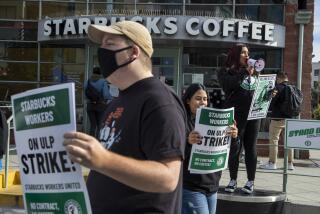Franchise Firms Gauge Impact of Price Ceilings
- Share via
As head of a company that owns 80 Burger King franchises, Daniel Chu is surprisingly blase about this week’s Supreme Court ruling that allows franchisers and manufacturers to establish price ceilings.
Chu said his reasoning is simple: He knows Burger King will ultimately suffer if its franchisees get priced out of the market.
“We do lose some freedom, and it will be hard for some of our restaurants to lower prices, but I’m not that worried,” said Chu, head of C&L; Restaurant in Canoga Park. “If there’s a national advertisement for 99-cent chicken sandwiches, it would make sense for us to participate because our customers would come in and expect the deal.”
Franchisers and franchisees across the country are trying to gauge the impact of Tuesday’s decision, which overturned a 29-year-old doctrine giving retailers and franchisees the freedom to set their own prices.
Many like Chu believe the decision won’t dramatically alter industry practices, but there are fears that some franchisees could be forced out of business if price ceilings are set too low.
“The bottom line is that consumers should be setting prices, not franchisers,” said Susan P. Kezios, president of the Chicago-based American Franchisee Assn. “I predict that some franchisees will be priced out of the market and that litigation is going to increase.”
Until now, franchisees could choose whether they participated in national discount campaigns. For instance, if Burger King promoted a 99-cent Whopper, individual franchisees could either go along with it or set their own prices. Advertisements promoting such campaigns had to include a warning that the promotion was only at participating stores.
But the Supreme Court ruling means that independent retailers and franchisees now can be forced to charge the lower price. The justices agreed that “price-fixing” benefits consumers and does not threaten competition.
Matthew Shay, chief counsel of the International Franchise Assn., which represents both franchisers and franchisees, doesn’t believe the ruling will have a “trickle-down effect” on franchised businesses.
“It’s absolutely not in the interest of franchisers to price products in a way that’s going to have a negative impact on franchisees,” he said. “Franchisers wouldn’t spend hundreds of thousands of dollars to locate franchisees and set them up in the business if they ultimately wanted to drive them out of the market.”
Although price ceilings could negatively affect some of his company’s restaurants, Chu said he has faith Burger King will set prices that won’t drive anyone out of business.
“I don’t think it’ll hurt us here in California, but in some states like Connecticut, we don’t do discounts because the competition is not as severe as it is in California,” he said. “But ultimately I know Burger King is a good company, and we’ll go along with whatever they decide.”
Bob Purvin, head of the American Assn. of Franchisees and Dealers, said he’s uncertain at this point whether the ruling is good or bad for his members.
Purvin said many franchisees would like to negotiate prices with franchisers but that franchisers have cited the previous price-fixing ban as a reason such talks couldn’t take place.
“This may open the door to negotiations,” he said. “But if you’re dealing with a product franchiser who’s not capable of negotiating, they’ll be able to dictate profit margins.”
Attorney Steven B. Feirman, who represented a coalition of franchisers and other companies in the Supreme Court case, said his clients have been hampered by not being able to enforce nationally advertised promotions.
“Consistency and uniformity are the hallmarks of franchise systems,” said Feirman, whose clients included Burger King, Baskin-Robbins, Motel 6, General Motors, Wendy’s and Dunkin’ Donuts. “The fact that franchisers were not able to establish price ceilings weakened the franchise systems, because consumers who frequented noncomplying franchisees would hold it against the brand.”
Feirman said he did not expect companies to immediately take advantage of the ruling. “But over time, there will be situations where the ruling will enter in their market strategy,” he said.
*
* SPECIAL REPORT: Next Wednesday in Small Business: A special report on venture capital in Southern California.
More to Read
Inside the business of entertainment
The Wide Shot brings you news, analysis and insights on everything from streaming wars to production — and what it all means for the future.
You may occasionally receive promotional content from the Los Angeles Times.










